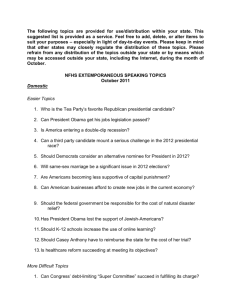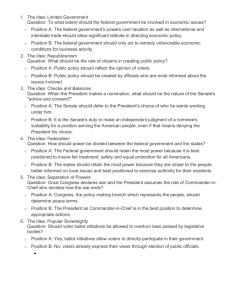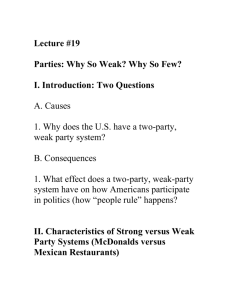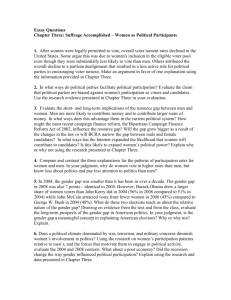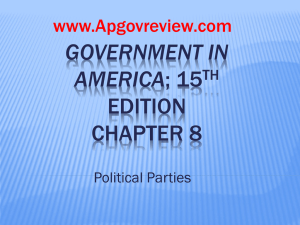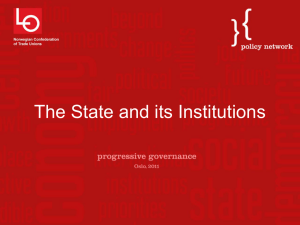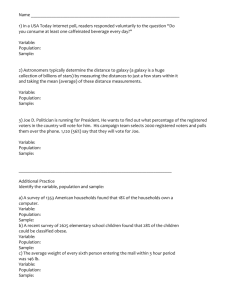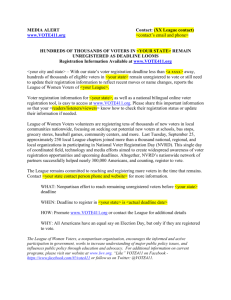Paul Ray NPC Briefing3Addnl
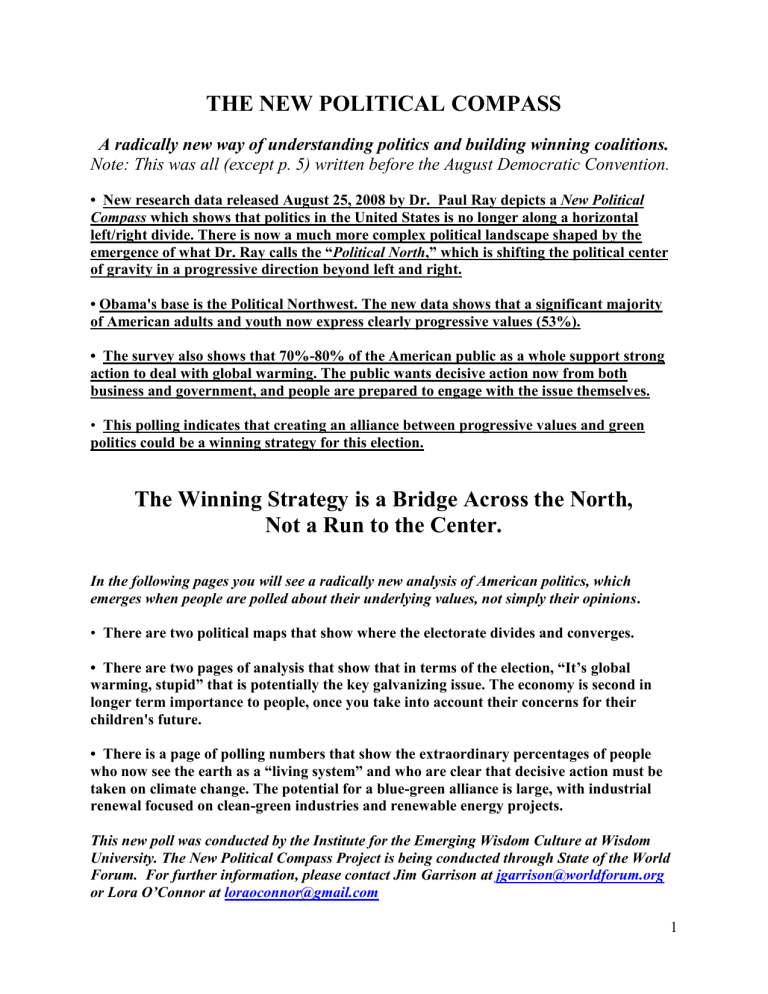
THE NEW POLITICAL COMPASS
A radically new way of understanding politics and building winning coalitions.
Note: This was all (except p. 5) written before the August Democratic Convention.
• New research data released August 25, 2008 by Dr. Paul Ray depicts a New Political
Compass which shows that politics in the United States is no longer along a horizontal left/right divide. There is now a much more complex political landscape shaped by the emergence of what Dr. Ray calls the “Political North,” which is shifting the political center of gravity in a progressive direction beyond left and right.
• Obama's base is the Political Northwest. The new data shows that a significant majority of American adults and youth now express clearly progressive values (53%).
• The survey also shows that 70%-80% of the American public as a whole support strong action to deal with global warming. The public wants decisive action now from both business and government, and people are prepared to engage with the issue themselves.
•
This polling indicates that creating an alliance between progressive values and green politics could be a winning strategy for this election.
The Winning Strategy is a Bridge Across the North,
Not a Run to the Center.
In the following pages you will see a radically new analysis of American politics, which
emerges when people are polled about their underlying values, not simply their opinions.
• There are two political maps that show where the electorate divides and converges.
• There are two pages of analysis that show that in terms of the election, “It’s global warming, stupid” that is potentially the key galvanizing issue. The economy is second in longer term importance to people, once you take into account their concerns for their children's future.
• There is a page of polling numbers that show the extraordinary percentages of people who now see the earth as a “living system” and who are clear that decisive action must be taken on climate change. The potential for a blue-green alliance is large, with industrial renewal focused on clean-green industries and renewable energy projects.
This new poll was conducted by the Institute for the Emerging Wisdom Culture at Wisdom
University. The New Political Compass Project is being conducted through State of the World
Forum. For further information, please contact Jim Garrison at jgarrison@worldforum.org
or Lora O’Connor at loraoconnor@gmail.com
1
2
More Than Just Left and Right: The New Political Compass (See the pictures)
The New Political Compass shows what you see if you look at politics through a values lens.
Everybody (not just the religious right) has a number of values —our most important priorities in life. This shapes four competing political cultures. Political values have two broad dimensions, not just left vs. right. This allows us to map voters and values by four sectors. This adds new facts beyond 'demographics' to describe voters, and works a lot better. It gives a clean way to describe political strategies, and also dramatically improves our targeting of messages to voter groups with different values. (Each sector talks differently when their own serious values concerns get raised, so they'll ignore ads that 'aren't talking to me'.)
Beyond left and right, a second dimension shows what "the center" and swing voters really want. As it turns out, it's not a mushy middle after all. (The mushy ones tend not to vote.)
They have a definite set of demands that both parties ignored until this election campaign: national health care, national education, ecological sustainability, women's issues, workers' needs, etc. The reason that so many voters have been ignored is simple: Political North is directly opposed to what Big Money wants. The compass picture shows it clearly: Big
Business Conservatives and their money are in the purple Political South, directly opposed to the green Political North. Business Conservatives rule through money, not numbers of voters.
If we want a participative strategy in the campaign, then we must look closely at, and speak most carefully to, the most actively interested voters: Political North. Why? They have more opinion leaders. And they are also the voters with the most practical organizing experience, coming from all the new social movements of the past 50 years: civil rights, women's rights, environment, anti-war, jobs and social justice, green products and organic food. That's how the Obama campaign got going so fast: the people motivated were already experienced.
Going green on the economy and energy is a winning election strategy. It bridges right across
Political North from New Progressives in the Political Northwest to Cross-Pressured groups who are both Green and Socially Conservative in the Political Northeast (Reagan Dems once were found there). Much of this North is hurting in the recession, so new green jobs, and rebuilding a clean-green industrial base and infrastructure will sound very good to them. It's obvious on this map, but the old left-right bell-shaped curve would insist you can't do this.
Both maps show cracks and divergence in Political South and East where the conservative coalition of the last 35 years is breaking up. The second map, showing 8 voter groups, also points to a convergence in Political Northwest where a Blue-Green synthesis now deserves our intense attention. The New Progressives would be the future of the Democratic Party if we undertook a shift to a clean-green economy as part of a global climate crisis strategy.
Al Gore's An Inconvenient Truth states global warming issues. The Apollo Alliance is an example of a whole class of programmatic solutions. It's crucial that Political North is the leading edge of recognizing the global climate crisis, and where the blue collar votes are.
The 8 types of voters reflect both values and socio-economic status (social class). The types in red and blue are totally familiar, and so are the New Progressives, but the others in the green tell us something new and important. In the Northeast, the two Cross-Pressured groups uncomfortably balance some of the greenest concerns with social conservatism. They need serious help in this recession, and they are now open to hearing some practical offers.
3
4
Cracks in the Republican Coalition (written after Obama’s inauguration):
You will notice three sets of cracks in the diagrams above:
1. The core of the Obama coalition is the Political Northwest, while the core of McCain's coalition is the Poltical Southeast. The most important cracks are in the eastern side of the
Political Northeast. It is between two parts of the social conservatives: A major split has developed betweeen newly green, socially concerned religious conservatives of both the Roman
Catholic and the fundamentalist strains on the one hand, versus the ultra-rightist business/social/militarist conservatives in the purist Political East.
Available for a new Obama coalition are those social conservatives who now want the social safety net, jobs programs and recession rescue very badly, and who also are "greener than green," believing in a new religiously conservative doctrine, 'creation care,' that justifies action on the ecological and climate crisis as well as taking care of the poor around the world. This did not exist even five years ago. On the green but conservative side are Rick Warren, Richard Cizik, and the Pope. The national council of evangelical leaders has already cast Cizik out, but the data shows that this is a values split right down the middle of religious conservatives, and it's not going away... The green conservative preachers are following their congregations' interests, and tend to have more of the younger and more moderate religious conservatives, many of whom are
Independents and conservative Democrats. If you want to know why Obama chose Rick Warren to give the opening Inaugural prayer, look no farther than here. It's values-wedge politics.
The old time Religious Right are more rabid Republican true believers. On that side the
Religious Right focuses on racism, anti-abortion, anti-gays, regressive aspects of capitalism, and a fear of Muslims, communists, hellfire and damnation. It manipulates hatreds and fears.
2. The failure of the Iraq war, and the failure of the Bush Administration to do much for social conservatives, was making serious cracks between the militarist/anti-communist/ColdWar conservatives of the Bush/McCain political Southeast, and the main body of the Religious Right.
The political map shows clearly the campaign calculation involved in McCain choosing Palin for a Vice President candidate: that growing split had to be stopped, and she energized the foot soldiers of the Religious Right. Otherwise, McCain would have lost in a landslide, as the rabid religious right did not vote at all. Because she wasn't competent, however, this offended most moderates, and it wound up still leaving McCain down by a lot of points.
3. Two sets of cracks in the McCain coalition developed in the Political South, between the business conservatives and the militarists, over the failed Iraq War, and the business conservatives and the moderates of the Political Southwest. As the recession got deeper, and finally, with the banking crash in September, a lot of the big money moderates saw McCain as a loser, and sat on their money, which was more important than the few votes they had. As the recession deepens, this big money part of the normally-Republican coalition shifts to Obama.
It has to be said that there are probably few values in this, except success. It is more cold opportunism: going with a winner. As the changeover to a clean, green economy accelerates with
Obama, major parts of this coalition could also be split off from the Republicans, because the big investment money always wants to go where the economy is going next.
Notice what this shows you: the map of the political compass predicted precisely where Obama had opportunities to play positive-values wedge politics. And he played them like a maestro.
5
Basic facts about Women Likely Voters in the Cross-Pressured Political Northeast
This is the most logical extension from the Obama base, and women can play a crucial role.
On the Political Compass map, the Cross-Pressured Political Northeast is a mix of blue liberal values, green ecology + climate crisis values, and red social conservative values. It is crucial that they are not merely in the "mushy middle." They have very intense, but mixed values. It’s a big sector, with two voter types, differing by social class: working class and middle to upper-middle class. The Political Northeast looks like it is in transition to being more blue-green, and could be helped along. They are the part of the the social conservative voters on the side of saving the planet and their children and grandchildren, and for helping the poor, in the developing schism between newer and older social conservatives. They look like the part of the crackup of the conservative coalition that is now available for Obama.
They are 35% of all likely voters. What’s more, they are 45% of all swing voters.
They are simply the largest available bloc of less-attached swing voters for Obama to go after.
They are 57% Democrats, 21% Republicans, and 21% Independents. But they see themselves as centrist Democrats, and include a lot of de facto swing voters. This is the sector of the political map that used to be called the 'Reagan Democrats,' but now they are a lot greener.
Women in the Cross-Pressured Northeast are 39.6% of all likely women voters.
There's a general gap of 8% between likely women and men voters in the ‘Green’ Political
North, with women voters at 54%, and men voters at 46% so the values that define this direction on the compass are often associated with women. Men and women see values pretty much the same in each "northerly" or "green" voter type, but there are simply more women there.
There’s a bigger 15% gender gap in the two Cross-Pressured Political Northeast voter types:
57.5% women likely voters, to 42.5% men likely voters. Appeals to women will really pay off. However, they will need to be mixed appeals, and must be values-laden to work.
The Cross-Pressured Political Northeast has 67% of likely African-American voters . A
"Bridge across the North" strategy could also link the Michele and Hillary women quite nicely if someone were to take that on...
The Cross-Pressured Political Northeast has 51% of all likely working class voters.
The Cross-Pressured Political Northeast has 40% of all likely Hispanic voters.
A “Bridge across the North” strategy on the New Political Compass would go after them with an appeal based on their “green” values, and the fact that they are really hurting in this recession. The core of that is a blue-green industrial strategy, including lots of green collar jobs. This would appeal both to their concerns about their children’s future in a world in climate crisis, and to their economic needs. Without that, McCain could gain their votes with a social conservative appeal.
It's time to make these voters a good offer that goes beyond the good rhetoric!
6
Important survey findings:
1) There's been a dramatic change in American attitudes on global warming in the last 2 years, and it's a drastic change from 10 years ago. Large majorities (70-80% range) of Americans now
'get ' that we are already in a climate change crisis—it's not sometime off in the future. They want action from business and government—but also to engage the issues themselves. It's really about saving the planet for our children and grandchildren. Support for this is closely related to support for the other 'new social movement' issues of the last 50 years: civil rights, women's rights, environment, anti-war, jobs and social justice, green products and organic food.
This crisis is now seen to be a full-blown planetary emergency, even though it is slowermoving compared to fast issues: a recession, or a Russian invasion of Georgia. This will persist, not come and go as a fad or some temporary emergency, because people will do for their children what they won't even do for themselves. This is a permanent emergency...
The winning strategy for this election could be to invoke a general mobilization of all three sectors of society around global climate crisis—political, economic, and civil society—as voter constituencies, consumer groups, social movement constituencies, the churches, intellectuals youth, and opinion leaders. In a recession year it's very important to have a new initiative like a major green-economy thrust to show the kind of 'real change' that Obama stands for. Many business leaders will back it to the hilt, even if some of the sunset industries
(big coal and oil) will resist. It's this year's bookend to 'It's the economy, stupid'.
There's a good match between our objective need, already described by Al Gore's calls to action, and the change in voter views. It's a chance for Obama to show political leadership, linked to a clean-green economy: one that we know McCain is not likely to take.
2) The economy is the second biggest issue of the campaign, and can be a mate to the above.
About 45% of the US are financially struggling one way or another. They are extremely worried or already hurting. Another 25% are starting to worry. The top 10% are feeling fine. In addition,
36% of the US (the worst off) want help for workers, on wages, saving jobs, working conditions.
The lower half of the American income distribution wants short term pain relief. But notice, they are just as strong for green issues and action on the global climate crisis as the rest of the population. They are also stronger in wanting back all the items of the Liberal safety net that the Bush regime has been tearing apart. They join huge majorities who now want national health care and national education. All these issues are correlated with each other: Want one, want most others. Nobody is a one-issue voter, it's all both-and.
Another important finding on the economy: half of the lower income voters who want help on economic issues are social conservatives, but not Republican. Many of them can be led right out of the McCain camp because they're ambivalent about him, and need economic help that Democrats can bring, and that McCain won't. And green initiatives suit them fine.
3) Americans simply want out of the war. More are ambivalent about the whole mess than in serious opposition. The electorate seems just to want to wash their hands of it, and be done with it. McCain looks like a loser on the war, because it ties him to a big, embarrassing, costly failure.
The Key Strategic Takeaway: Democrats have support from a huge majority of the American people to advance the ecological sustainability agenda in the form of a clean-green economic transformation. It not only responds to the recession: It makes the US economy more competitive, and saves the planet from climate crisis. This will get an enthusiastic response.
7
Dr. Ray’s National Survey on Values, Ecology, Politics: 2000 respondents, representative US sample, 55% response rate. Mail questionnaire to a national panel of people who had pre-agreed to respond to several surveys over the year. Fieldwork was done by TNS, world's largest survey research corporation, in March/April, 2008.
There's been a dramatic shift at the values level in 10 years toward more ecological and planetary awareness.
Americans are now emotionally ready to act on global warming and ecological crisis, and it really fits their values.
But they are not yet clear what to do, or what sacrifice is needed, if any. They want leadership from government and business and believe in technological solutions. They are more aware of planetary problems than 10 years ago.
From Values Section of Questionnaire:
68.35% say Very or Extremely Important is: concern that our country has been headed in the wrong direction
64.50% say Very or Extremely Important is: concern that my children will live in a much worse world than I grew up in
60.35% say Very or Extremely Important is: helping to create a sustainable world for myself and for my children
57.95% say Very or Extremely Important is: making sure that we leave a decent legacy for future generations
55.80% agree: Our materialistic way of life can be replaced by a new, more hopeful one
51.70% say Very or Extremely Important is: wanting to be involved in creating a better society than we have today
49.95% say Very or Extremely Important is: desire for a more ecologically sustainable way of life in America
From Ecology Section of Questionnaire:
87.05% agree: We need to treat the planet as a living system
83.20% agree: Each generation’s duty is to make the world a better place for future generations
82.45% agree: We must stop the destruction of the globe’s farmlands, forests and oceans
82.45% agree: Humans need to have more respect and reverence for Nature
81.25% agree: Corporations must take more responsibility for their impact on global warming
80.20% agree: We should change the way we live now so future generations have decent lives
75.35% agree: People need to work for the good of the planet, for it is our only home
73.40% agree: We have a moral duty to protect all God’s creatures from extinction
71.75% agree: It is our sacred obligation to care for God’s creation
70.50% agree: I see myself as a citizen of Planet Earth as well as an American
63.00% agree: Too many people refuse to accept the seriousness of global warming
62.00% agree: The earth is headed for an environmental catastrophe unless we change
60.40% agree: America needs to take the lead on global warming, not drag its feet
55.40% agree: We need solar and wind power for global warming, not coal and nuclear
Theme: They're willing to get involved, but they won't just agree to pay through the nose to solve our problems
51.00% agree: I’m willing to do volunteer work as part of a commitment to help save the planet
45.45% agree: Working on the planet’s problems is now the main task for humanity
For here are some very familiar survey results from those very same people: only 25.45% agree: I'd pay more taxes to help solve our global warming problems (50% disagree) only 22.95% agree: I’d pay 50 cents more a gallon for gasoline if it’s used to stop global warming (50% disagree)
8
CONTACT INFORMATION
The study on the New Political Compass is part of a larger study on the Cultural Creatives being conducted by Dr. Paul Ray though his Institute for the Emerging Wisdom Culture at Wisdom
University, or paulhray@gmail.com. For further information: https://www.wisdomuniversity.org/cultural-creatives.htm
State of the World Forum, a 501c3 non profit organization, has partnered with Wisdom
University and has established The New Political Compass Project which seeks to mobilize a national public education campaign around the issues raised by the study. For more information: http://www.worldforum.org/political-compass-project.html
Additionally, both Wisdom University and State of the World Forum have come together with a broad coalition of groups to issue a Global Call to Action which appeals to national leaders around the world to take seriously the threat of global warming and embrace Al Gore’s July 17 proposal to source all our electricity through renewable energy within the next ten years. For more information: http://www.worldforum.org/
State of the World Forum is convening a major international conference on these and related themes in Washington D.C. November 9-15, 2009.
For more information: http://www.worldforum.org/state-2009.htm
For further information, please contact Jim Garrison at 415-388-2114 or by email at jgarrison@worldforum.org
9

